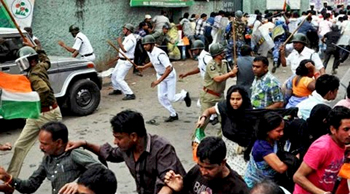New Delhi, Sep 3: The day-long nationwide strike on Wednesday impacted normal life in various parts of the country with coal production, banking operations and transport services being hit the most. The impact of the strike was most visible in states like West Bengal, where violent clashes erupted and resulted in the arrest of over 1,000 persons.
 The strike call was given by 10 central trade unions against changes in labour laws, the privatisation of public sector undertakings and for other demands. The BJP-backed Bharatiya Mazdoor Sangh (BMS) and NFITU, however, stayed away from the strike.
The strike call was given by 10 central trade unions against changes in labour laws, the privatisation of public sector undertakings and for other demands. The BJP-backed Bharatiya Mazdoor Sangh (BMS) and NFITU, however, stayed away from the strike.
Union leaders claimed that over 15 crore organised sector workers went on strike. The government, however, said the strike did not have much impact in most parts of the country even as it hinted at meeting the “aspirations” of the workers on nine of their 12 demands.
Terming the all-India general strike “a great success”, Left parties congratulated the protesters for staging “one of the biggest” demonstrations of the working class against the Centre’s alleged anti-labour policies. “Great success I should say. (The response) was more than expected. It is one of the biggest actions of the working class and the manifestation of their unity against the anti-labour policies of the government,” CPI general secretary S. Sudhakar Reddy said.
Apart from West Bengal, the other states where the impact was total were Tripura, Kerala, Karnataka, Puducherry and Orissa, while partial impact was visible in Delhi, Punjab, Haryana, Tamil Nadu, Goa, Gujarat, Bihar and Jharkhand.
In West Bengal, over 1,000 persons were arrested from different parts of the state after clashes occurred at some places between Left and Trinamul workers, including in Murshidabad district.
Altogether 974 people were arrested in various districts and 50 others in the metropolis for trying to enforce the bandh, West Bengal chief minister Mamata Banerjee told reporters in Kolkata.
Train services of the South Eastern Railway and Eastern Railway were partially affected, but Metro rail services in Kolkata remained normal. Ms Banerjee also said that “the bandh failed to evoke any response and state government offices in the city recorded 93 per cent attendance and 97 per cent in the districts”.
Normal life was affected in Assam, Andhra Pradesh, Telangana and Rajasthan also, but there was not much impact in Mumbai, except on banking services. Commodity markets remained closed in most part of India.
The labour ministry said that out of 12 central trade unions, two did not join the strike, three unions remained neutral and only seven unions went on strike. It claimed the situation by and large remained normal and peaceful across India and that the government was positive on many of the workers’ demands without any pressure. The 10 unions, however, said in a joint statement that the response to the strike call was “unprecedented” and ”millions of workers” had stayed away from work.
Banking services were among the worst hit as 23 public sector banks, 12 private sector banks, 52 regional rural banks and over 13,000 cooperative banks joined the stir. However, staff at SBI, Indian Overseas Bank, ICICI Bank, HDFC Bank and Axis Bank chose not to go on strike.
All-India Bank Employees Association general secretary C.H. Venkatachalam said nearly five lakh bank employees and officers joined the strike.
Labour minister Bandaru Dattatreya, who on Wednesday left for Turkey along with labour secretary Shankar Aggarwal for a G-20 meeting, had on Tuesday appealed to the trade unions to call off the agitation in the interest of the workers and the nation. But the unions decided to go ahead after their talks with a ministerial panel last month failed to yield the desired results on their 12 demands.
The demands included urgent measures to rein in price-rise, contain unemployment, the strict enforcement of basic labour laws, universal social security cover for all workers and a minimum wage of `15,000 per month. They also demanded higher pensions, the stopping of disinvestment in PSUs, ending the contract system, the removal of the ceiling on bonus payments and provident fund, compulsory registration of trade unions within 45 days, no unilateral amendment to labour laws and the stopping of FDI in the railways and in the defence sector.
Expressing solidarity with the strike, the Congress blamed the government’s “utter apathy” for the workers” agitation.
“It seems just as the British wanted to benefit the East India Company at the expense of millions of labourers of this country, the Modi government wants to benefit five-six crony businessmen friends of this government,” party spokesperson Abhishek Singhvi told reporters.





Comments
Add new comment